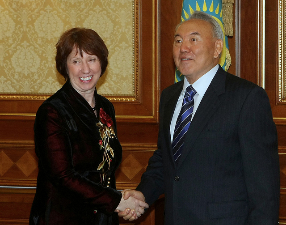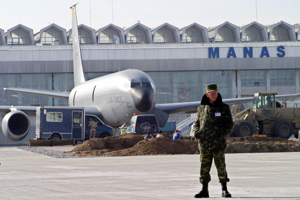The U.S. Role in International Mediation of the South Caucasus Peace Process
By Robert M. Cutler
June 26, 2023
Intensive rounds of negotiations between Armenia and Azerbaijan over the past few months seem to be hitting a pause. Some progress has been made via each of the now-existing three tracks sponsored respectively by Russia, by the EU, and by the U.S. These have shown a certain limited mutual complementarity, yet crucial issues still await authoritative resolution. At present, only the U.S. would appear to have the goal of a final peace treaty firmly in sight. The process presided by Council of the EU President Charles Michel in Brussels may potentially still be helpful, but the activity of other EU institutions has become obstructive. U.S. diplomacy should not allow the current momentum to dissipate.

Reaffirming Balance: Kazakhstan's Expanded Foreign Policy Strategy and its Response
By S. Frederick Starr (10/29/2014 issue of the CACI Analyst)
Kazakhstan may have not had a choice as to whether or not to join the Customs Union, given geographical realities and President Nazarbayev’s long advocacy of that course. Now that it is joining, however, Kazakhstan has advanced a new strategy that seeks to rescue and preserve its “balanced” or “multi-vectored” foreign policy and to extend it beyond geopolitics into economics and security. This requires the full engagement of the EU and U.S. The EU’s October 2014, Enhanced Partnership and Cooperation Agreement with Kazakhstan advances this goal in the economic realm, but does not touch security. The U.S. has yet to take make similar advances in its economic or security relations with Kazakhstan.

Tajikistan's Government Enraged by Corruption Allegations
By Oleg Salimov (08/05/2014 issue of the CACI Analyst)
Tajikistan’s government is irate with the report on the country’s investment outlook recently published by the U.S. Department of State. The report, named 2014 Investment Climate Statement – Tajikistan, was prepared by the Bureau of Economic and Business Affairs at the U.S. Department of State. Although the report explains the financial risks for prospective investors in Tajikistan, Tajik officials chastised the U.S. Embassy in Tajikistan for interfering with Tajikistan’s internal policy and attempting to destabilize the political situation in the country.
The resentment with the report among Tajik officials was provoked by a part of the report describing the problem of government corruption. Responding to data on corruption published in the report, Saifullo Safarov, deputy head of the Center of Strategic Research under the President of the Republic of Tajikistan, accused the report publishers of attempting to trigger political unrest in Tajikistan. Without referring directly to the U.S., Safarov noted that by publishing such information, certain foreign countries pursue the goal of destabilizing Tajikistan.
Such a reaction by Tajik officials to the evaluation of the country’s investment prospects derives from their fear of provoking a Ukrainian Maidan-type of revolution in Tajikistan. In Ukraine, the Maidan movement started as a social rejection of corruption in government, which affected all levels of power and culminated at the highest governmental post – the president. The corrupt political elite, including president Yanukovych, was ousted from office as a result of the Maidan movement. President Rahmon understands the fragility of his position and the high potential for a Maidan-type upheaval in the country, which also explains Safarov’s erratic commentary on the report.
The information published by the Department of State is not in any way new or sensational. Ordinary Tajiks are well aware of the problem as they have to face it on a regular basis. The report reviews the system of bribes, the practices of cronyism, and spheres of influence of different government agencies, specifically the notorious corruption in the Anticorruption agency. Safarov, in turn, failed to provide information on the efforts taken by the Tajik government to eliminate corruption or explain the connection between the report and potential political destabilization.
The assessment of the investment climate is common practice as it explains risks and benefits of conducting business in a certain country. In fact, only a small part of the report was devoted to the problem of corruption while the main part reviewed the country’s economy as a whole. The report is addressed to prospective foreign investors interested in Tajikistan and not to the general Tajik public. Accustomed to their ability to filter information, Tajik government officials seek to control even sources that are out of their legal reach such as the U.S. Department of State. Any dissent is seen as a direct challenge to the current regime.
The span of the corruption problem extends into the involvement of Tajik law enforcement and judiciary in disputes with foreign and local businessmen to benefit Tajikistan’s ruling elite. This practice is also widely employed to constrain political opposition in Tajikistan. Thus, on April 21, 2014 the court in the city of Tursunzade ordered the confiscation of the property of Muhiddin Kabiri, leader of the opposition Party of Islamic Renaissance of Tajikistan. The case against Kabiri was initiated by the Anticorruption agency, ironically notorious for its corruption. The ownership of the large marketplace Sakhovat in Tursunzade was transferred from Kabiri to the Tajik Committee on Youth, Sport and Tourism. The court rejected Kabiri’s arguments that the case was politically motivated. In an interview to a local newspaper, Kabiri complained that his close relatives were repeatedly subjected to persecution, extortion, and bribes by the Anticorruption agency, the Tajik Revenue services, and other state inspection agencies.
In another case, the Anticorruption agency in cooperation with Tajikistan’s judiciary, including the Supreme Court, and the State Committee on National Security GKNB (former KGB) successfully neutralized Zaid Saidov, a potential challenger to Rahmon, from Tajikistan’s political arena. Saidov received a 26-year imprisonment term and confiscation of property. The anticorruption agency also won another property confiscation case against Ukrainian businessman Dmitry Firtash and Saidov’s son Khairullo. Numerous properties belonging to Firtash in Tajikistan were transferred to the Tajik government.
In this context, the furious protests of Tajik officials against the assessment of corruption in Tajikistan, conducted within a much larger examination of the country’s investment climate, seems highly inappropriate and troubling. According to Transparency International, from 2003 to 2013 Tajikistan dropped from 124th to 154th place among 175 countries in TI’s Corruption Perceptions Index. It is the brazen level of corruption in the country and the official disregard of the problem that may eventually provoke a public outburst, and not the investment climate report as alleged by Tajik government representatives.
Kyrgyzstan's Decision To Renounce Manas Transit Center Favors Russia
by Erica Marat (06/26/2013 issue of the CACI Analyst)
The Kyrgyz parliament has voted to support President Almazbek Atambaev’s decision to renounce the contract for the U.S. transit center at Manas airport. The main reasons for the parliament’s vote were primarily a response to the Kremlin’s decision to write off a large chunk of Kyrgyzstan’s debt and to Moscow’s promise to construct hydropower plants in Kyrgyzstan, as well as to Washington’s abrupt decision to dismiss criminal charges against Maksim Bakiev, son of former president Kurmanbek Bakiev. In the meantime, uncertainty lingers regarding the finality of the parliament’s decision and how the president will proceed with his plan to build an international transit hub at Manas once the U.S. leaves.





